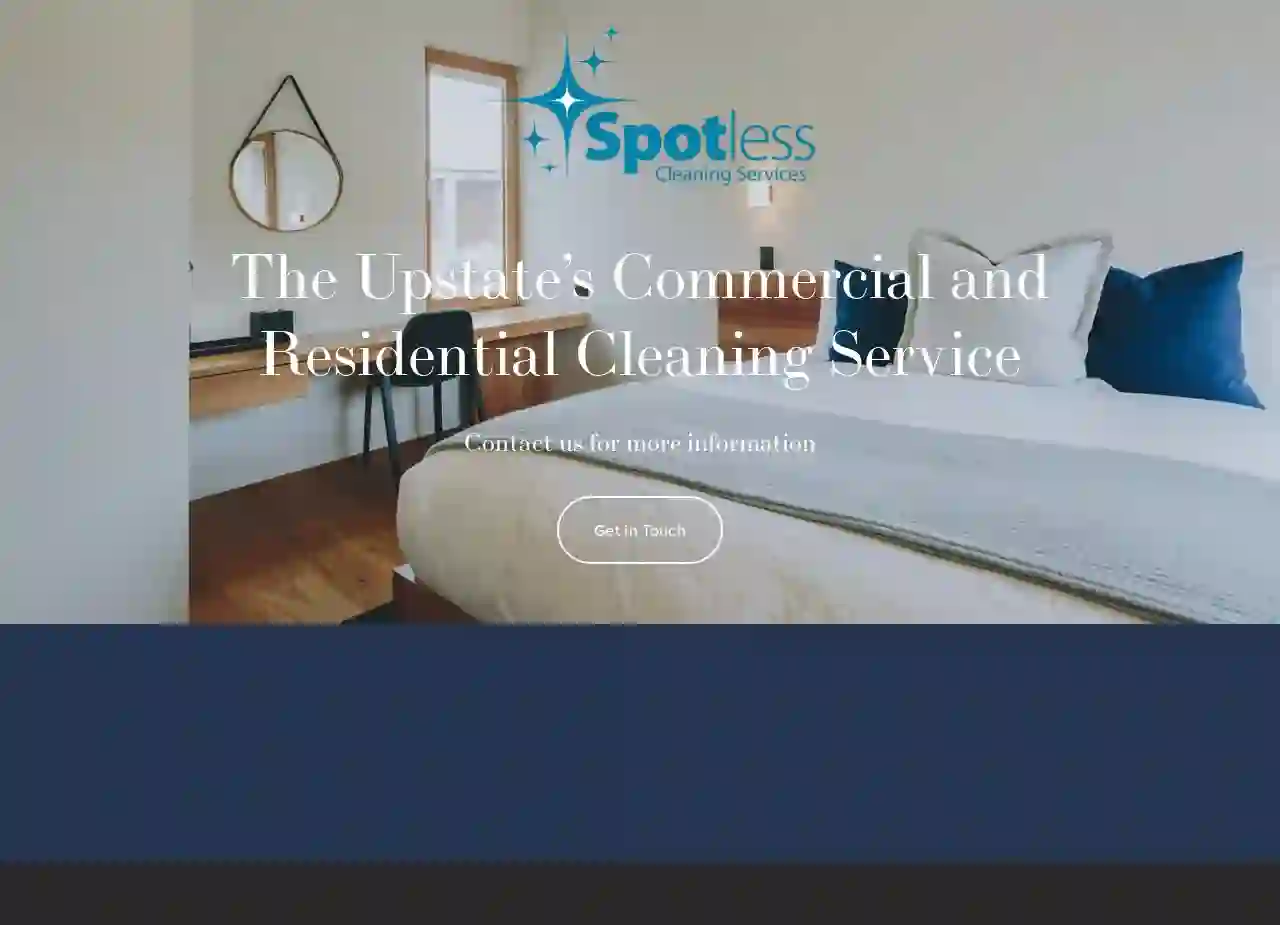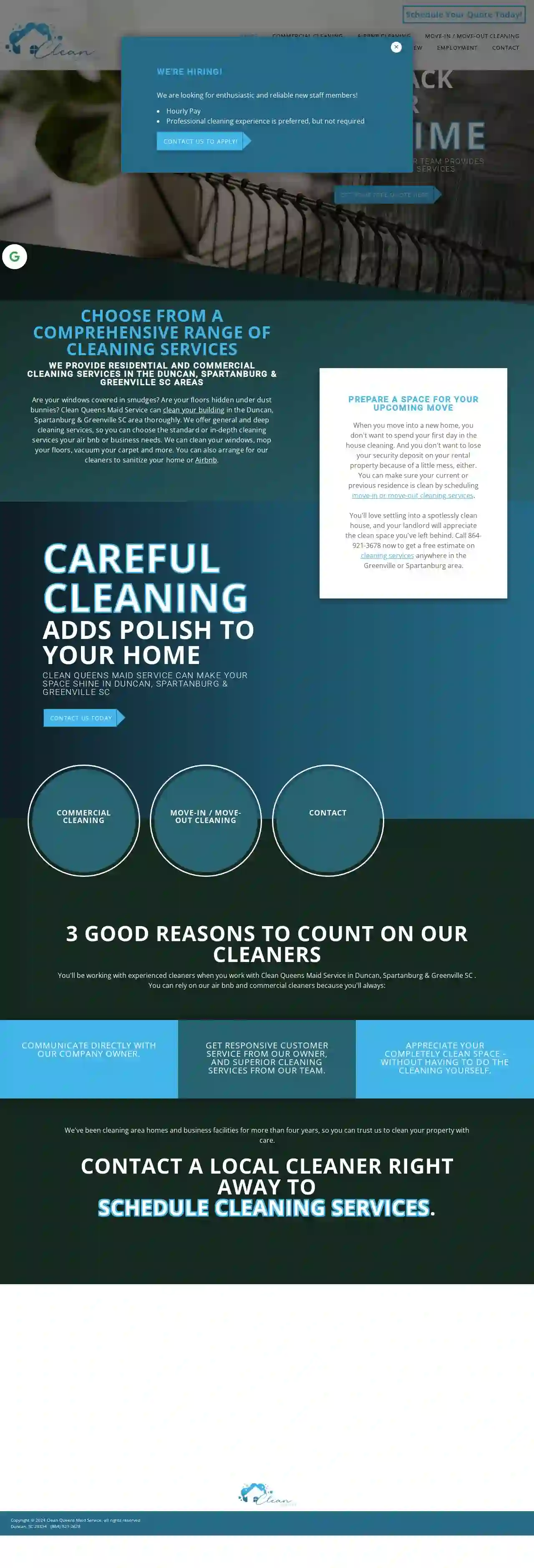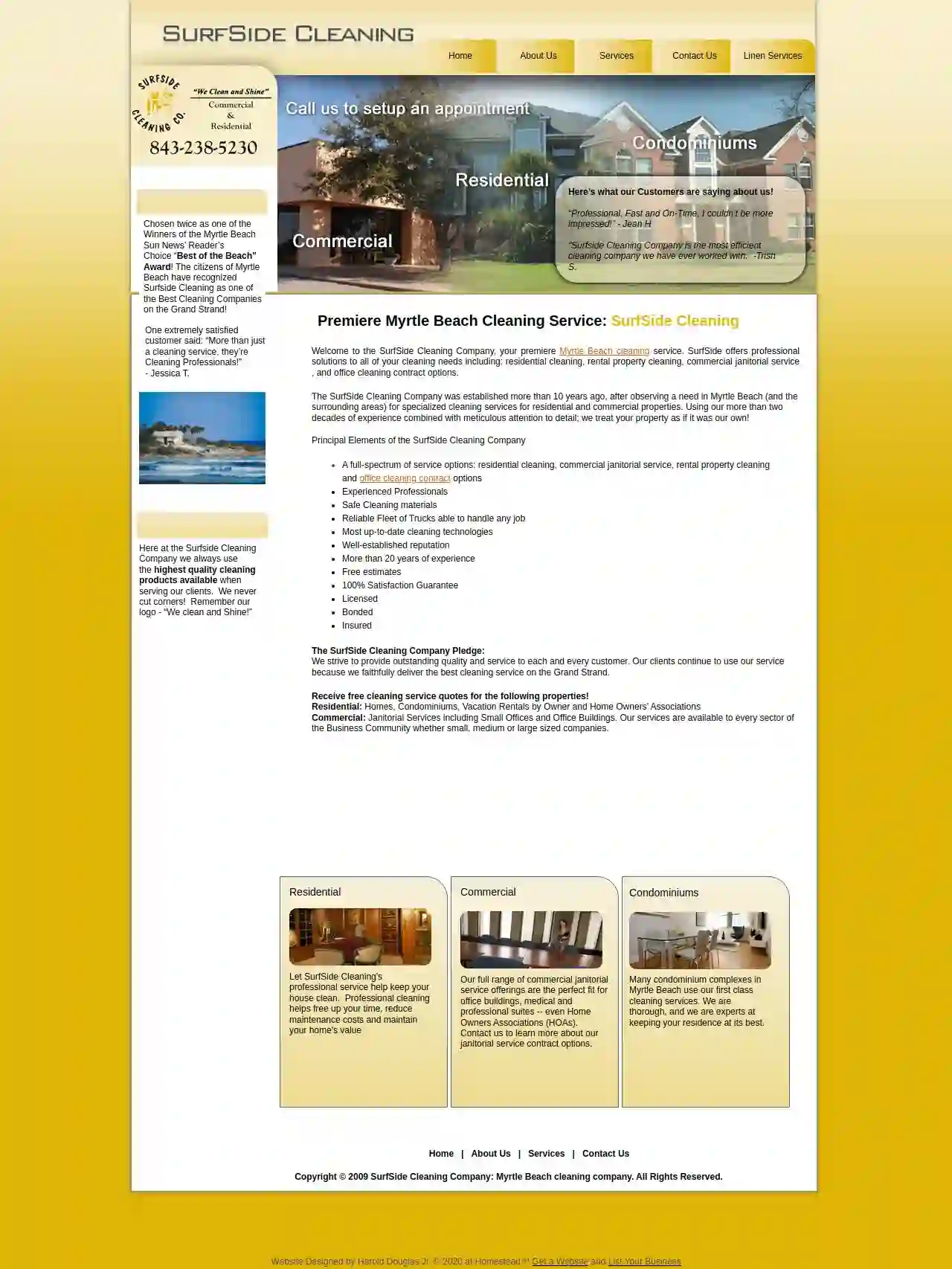Cleaning Services Newport
Find top Local Cleaners in Newport
Get 3 FREE House Cleaning quotes for your project today! Compare profiles, reviews, accreditations, portfolio, etc... and choose the best deal.
Service Needed
City or Town

Spotless Cleaning Service
59 reviewsSpartanburg, US- Services
- Why Us?
Get Quote- A&
A&NCLEANINGLLC
55 reviewsMyrtle Beach, US- Services
- Why Us?
Get Quote 
Clean Queens Maid Service
531 reviewsSpartanburg, US- Services
- Why Us?
Get Quote
C&R Cleaning Services & More LLC
515 reviewsMyrtle Beach, US- Services
- Why Us?
Get Quote- Ka
Karol’s Cleaning Services
4.710 reviewsSpartanburg, US- Services
- Why Us?
Get Quote - Ul
Ultra Clean Cleaning Services, LLC
550 reviewsMyrtle Beach, US- Services
- Why Us?
Get Quote 
Jani-King of Myrtle Beach
3.510 reviewsMyrtle Beach, US- Services
- Why Us?
Get Quote- A&
A&S Cleaning Professionals
4.713 reviewsMyrtle Beach, US- Services
- Why Us?
Get Quote 
Surfside Cleaning Co
4.416 reviewsMyrtle Beach, US- Services
- Why Us?
Get Quote
Hoodz of Myrtle Beach
55 reviewsMyrtle Beach, US- Services
- Why Us?
Get Quote
Over 60,241+ Cleaning Services in our network
Our cleaning services operate in Newport and beyond!
CleaningMatch has curated and vetted Top Cleaning Services arround Newport. Find a top & reliable pro today.
Frequently Asked Questions About Cleaning Services
Find answers to common questions about cleaning services and hiring cleaning companies in the USA.
- Type of cleaning: Deep cleaning, regular cleaning, move-in/move-out cleaning, and specialized cleaning (e.g., carpet cleaning) have different price points.
- Size of the property: Larger properties typically require more time and resources, resulting in higher costs.
- Frequency of cleaning: Regular cleaning schedules often have discounted rates compared to one-time services.
- Location: Cleaning costs can differ based on regional labor costs and demand.
- Additional services: Extra tasks, such as window cleaning, laundry, or organization, will add to the overall price.
- Regular Sweeping or Dust Mopping: Sweep or dust mop hardwood floors daily to remove dust, dirt, and debris.
- Vacuuming: Vacuum hardwood floors weekly using a vacuum cleaner with a hardwood floor attachment to avoid scratches.
- Damp Mopping: Damp mop hardwood floors with a hardwood floor cleaner as needed. Avoid excessive water, as it can damage the wood.
- Prevent Scratches: Place felt pads under furniture legs to prevent scratches. Avoid dragging heavy objects across the floor.
- Avoid Harsh Cleaners: Do not use harsh chemicals, abrasive cleaners, or furniture polish on hardwood floors.
- Professional Cleaning: Consider hiring a professional hardwood floor cleaning service for deep cleaning and refinishing as needed.
- Weekly: Suitable for busy households with children or pets, ensuring a consistently clean and healthy environment.
- Bi-weekly: A good option for smaller households or those who maintain a relatively clean home.
- Monthly: May be sufficient for individuals or couples who live a minimalist lifestyle.
- Quarterly or Annually: Can be suitable for deep cleaning or seasonal cleaning tasks.
- Regular dusting: Dust frequently using microfiber cloths or a duster. Pay attention to surfaces that attract dust, such as shelves, electronics, and furniture.
- Vacuuming: Vacuum carpets and rugs regularly using a vacuum cleaner with a HEPA filter to trap dust mites and allergens.
- Air Purifier: Consider using an air purifier to remove dust particles and allergens from the air.
- Reduce Clutter: Clutter provides more surfaces for dust to settle. Declutter regularly to minimize dust traps.
- Window Treatments: Wash or vacuum window treatments, such as curtains or blinds, regularly to remove dust buildup.
- Bedding: Wash bedding, including sheets, pillowcases, and blankets, weekly in hot water to remove dust mites.
- Doormats: Place doormats at entrances to trap dirt and dust from shoes before they enter your home.
How much do cleaning services cost in the USA?
Cleaning service costs in the USA vary based on several factors, including:
To get accurate pricing, request personalized quotes from reputable cleaning services on CleaningMatch. They will assess your specific needs and provide a tailored cost estimate.
To get accurate pricing, request personalized quotes from reputable cleaning services on CleaningMatch. They will assess your specific needs and provide a tailored cost estimate.
What are some tips for cleaning hardwood floors?
Hardwood floors add elegance and warmth to a home, but they require proper care to maintain their beauty. Here are some tips:
By following these tips, you can keep your hardwood floors looking beautiful for years to come.
By following these tips, you can keep your hardwood floors looking beautiful for years to come.
How often should I have my house cleaned?
The frequency of house cleaning depends on factors like your lifestyle, the size of your house, and your personal preferences. Here's a general guideline:
You can adjust the frequency based on your needs and budget. Some people opt for weekly cleaning for high-traffic areas like kitchens and bathrooms and bi-weekly cleaning for the rest of the house.
You can adjust the frequency based on your needs and budget. Some people opt for weekly cleaning for high-traffic areas like kitchens and bathrooms and bi-weekly cleaning for the rest of the house.
How do I prevent dust from accumulating in my home?
Dust is a common household nuisance, but several preventive measures can minimize its accumulation:
By implementing these preventive measures, you can significantly reduce dust accumulation and maintain a cleaner and healthier home.
By implementing these preventive measures, you can significantly reduce dust accumulation and maintain a cleaner and healthier home.
How much do cleaning services cost in the USA?
Cleaning service costs in the USA vary based on several factors, including:
To get accurate pricing, request personalized quotes from reputable cleaning services on CleaningMatch. They will assess your specific needs and provide a tailored cost estimate.
- Type of cleaning: Deep cleaning, regular cleaning, move-in/move-out cleaning, and specialized cleaning (e.g., carpet cleaning) have different price points.
- Size of the property: Larger properties typically require more time and resources, resulting in higher costs.
- Frequency of cleaning: Regular cleaning schedules often have discounted rates compared to one-time services.
- Location: Cleaning costs can differ based on regional labor costs and demand.
- Additional services: Extra tasks, such as window cleaning, laundry, or organization, will add to the overall price.
To get accurate pricing, request personalized quotes from reputable cleaning services on CleaningMatch. They will assess your specific needs and provide a tailored cost estimate.
What are some tips for cleaning hardwood floors?
Hardwood floors add elegance and warmth to a home, but they require proper care to maintain their beauty. Here are some tips:
By following these tips, you can keep your hardwood floors looking beautiful for years to come.
- Regular Sweeping or Dust Mopping: Sweep or dust mop hardwood floors daily to remove dust, dirt, and debris.
- Vacuuming: Vacuum hardwood floors weekly using a vacuum cleaner with a hardwood floor attachment to avoid scratches.
- Damp Mopping: Damp mop hardwood floors with a hardwood floor cleaner as needed. Avoid excessive water, as it can damage the wood.
- Prevent Scratches: Place felt pads under furniture legs to prevent scratches. Avoid dragging heavy objects across the floor.
- Avoid Harsh Cleaners: Do not use harsh chemicals, abrasive cleaners, or furniture polish on hardwood floors.
- Professional Cleaning: Consider hiring a professional hardwood floor cleaning service for deep cleaning and refinishing as needed.
By following these tips, you can keep your hardwood floors looking beautiful for years to come.
How often should I have my house cleaned?
The frequency of house cleaning depends on factors like your lifestyle, the size of your house, and your personal preferences. Here's a general guideline:
You can adjust the frequency based on your needs and budget. Some people opt for weekly cleaning for high-traffic areas like kitchens and bathrooms and bi-weekly cleaning for the rest of the house.
- Weekly: Suitable for busy households with children or pets, ensuring a consistently clean and healthy environment.
- Bi-weekly: A good option for smaller households or those who maintain a relatively clean home.
- Monthly: May be sufficient for individuals or couples who live a minimalist lifestyle.
- Quarterly or Annually: Can be suitable for deep cleaning or seasonal cleaning tasks.
You can adjust the frequency based on your needs and budget. Some people opt for weekly cleaning for high-traffic areas like kitchens and bathrooms and bi-weekly cleaning for the rest of the house.
How do I prevent dust from accumulating in my home?
Dust is a common household nuisance, but several preventive measures can minimize its accumulation:
By implementing these preventive measures, you can significantly reduce dust accumulation and maintain a cleaner and healthier home.
- Regular dusting: Dust frequently using microfiber cloths or a duster. Pay attention to surfaces that attract dust, such as shelves, electronics, and furniture.
- Vacuuming: Vacuum carpets and rugs regularly using a vacuum cleaner with a HEPA filter to trap dust mites and allergens.
- Air Purifier: Consider using an air purifier to remove dust particles and allergens from the air.
- Reduce Clutter: Clutter provides more surfaces for dust to settle. Declutter regularly to minimize dust traps.
- Window Treatments: Wash or vacuum window treatments, such as curtains or blinds, regularly to remove dust buildup.
- Bedding: Wash bedding, including sheets, pillowcases, and blankets, weekly in hot water to remove dust mites.
- Doormats: Place doormats at entrances to trap dirt and dust from shoes before they enter your home.
By implementing these preventive measures, you can significantly reduce dust accumulation and maintain a cleaner and healthier home.